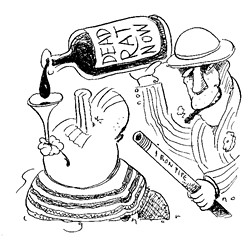
Hi mate. A question from no-capital-punishment Australia: I've noticed how difficult it's become to get the necessary goop for lethal injections, with chemical companies refusing to supply it, etc. (when a chemical company is worried about its reputation, then yikes), leading to some states mixing their own cocktails, with horrific results. Why don't they use heroin or some other opiate? Isn't an overdose a reliable way of killing someone, shutting down breathing, consciousness and pain? It's easy to get and make. If they're not dead, add a bit more and they soon will be. —Andrew McDonald
Appreciate the attempt to be helpful, Andrew. However, your idea has a couple fatal flaws.
First, death by opiate overdose isn't as easy as you think. For example, a study of your fellow Australians overdosing on heroin found that many, rather than slipping peacefully into oblivion, suffered from vomiting, numbness and temporary paralysis, confusion, and dizziness. (Violent vomiting, grim enough in itself, also carries the risk of vomit aspiration.) A few experienced lung swelling, seizures, and irregular heartbeat.
Heroin overdose can cause difficulty in breathing, one of your less pleasant experiences. Death by OD is often slow, with an average of one to three hours between injection and the end.
Then there's the problem of determining the proper dosage. Depending on how much tolerance the prisoner has developed to opiates, the lethal dose can vary by a factor of ten. Dosing is difficult even with drugs used by experts on a daily basis—anesthesiologists start with an approximate dose based on the weight, age, and medical condition of the patient, and then adjust it continually during surgery based on vital signs.
No anesthesiologist presides over an execution; the work is left to technicians who may not be monitoring the prisoner at all and don't necessarily know what they're doing. One review of post-execution toxicology reports from Arizona, Georgia, and North and South Carolina showed what was likely insufficient anesthesia in 43 of 49 executed inmates, with 21 having levels so low they may have been conscious when the searingly painful life-ending drugs kicked in.
This brings us to your second, more fundamental mistake: assuming there's a humane way to execute someone. A constant theme in the history of capital punishment has been the quixotic search for a consistently quick, easy, and painless means of taking a life. Centuries of execution-day horror stories strongly argue that no such thing exists.
Hanging and the firing squad were once seen as humane alternatives to dismemberment, burning at the stake, crucifixion, etc.; it's fair to say no one views them that way now. The guillotine was likewise thought to be quick and painless, but animal research plus the grim tale reported in this column back on June 12, 1998 persuade me it's possible for a beheaded person to be aware for several seconds afterwards.
Electrocution gained favor in the late 19th century as a more humane method than hanging, its greatest advocate a Buffalo dentist who'd heard about a drunk getting zapped by an electrical generator. But the first attempt was gruesomely botched (I wrote about that too), and things went spectacularly wrong so often in the ensuing decades that even death penalty advocates became convinced a better way had to be found.
The gas chamber at one point was thought to be that way. The problem is that any prisoner who doesn't cooperate by taking deep breaths of the poison (would you?) can go into convulsions and suffer the tortures of the damned.
Then we come to lethal injection, which was (again) thought to be an improvement over prior methods. But as is now well known, much can go wrong. Death can take as long as ten minutes if the prisoner's veins are poor or the line clogs. In the case of the 1988 execution of Raymond Landry, Texas officials messed up the procedure so badly it took 24 minutes for Landry to die.
Granted, much of the difficulty with lethal injection in recent times has stemmed from widening revulsion against capital punishment. The American Medical Association forbids members from participating in lethal injections, as do other professional organizations. A new array of legal challenges has emerged from the manufacturers of the drugs, who want nothing to do with the practice. In 2013 the U.S. was threatened with an embargo of the critical anesthetic propofol due to the state of Missouri's insistence on using it for capital punishment.
Kentucky, Tennessee, and Georgia illegally imported their lethal injection drugs. Some states have resorted to having their employees submit prescriptions for the drugs and paying for them with their personal credit cards. Other harebrained methods have been proposed, such as "allowing" prisoners to commit suicide.
I can imagine a defender of capital punishment arguing that this is all liberal handwringing and that the alternative, namely life in prison without chance of parole, is itself cruel (if hardly unusual). The obvious answer is that it's considerably less cruel than being put to death; rather, for heinous crimes, it seems justly harsh. Isn't that enough?
Send questions to Cecil via StraightDope.com or write him c/o Chicago Reader, 350 N. Orleans, Chicago 60654.